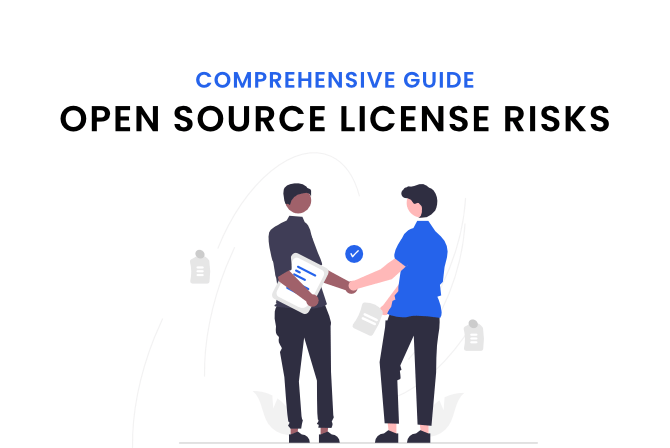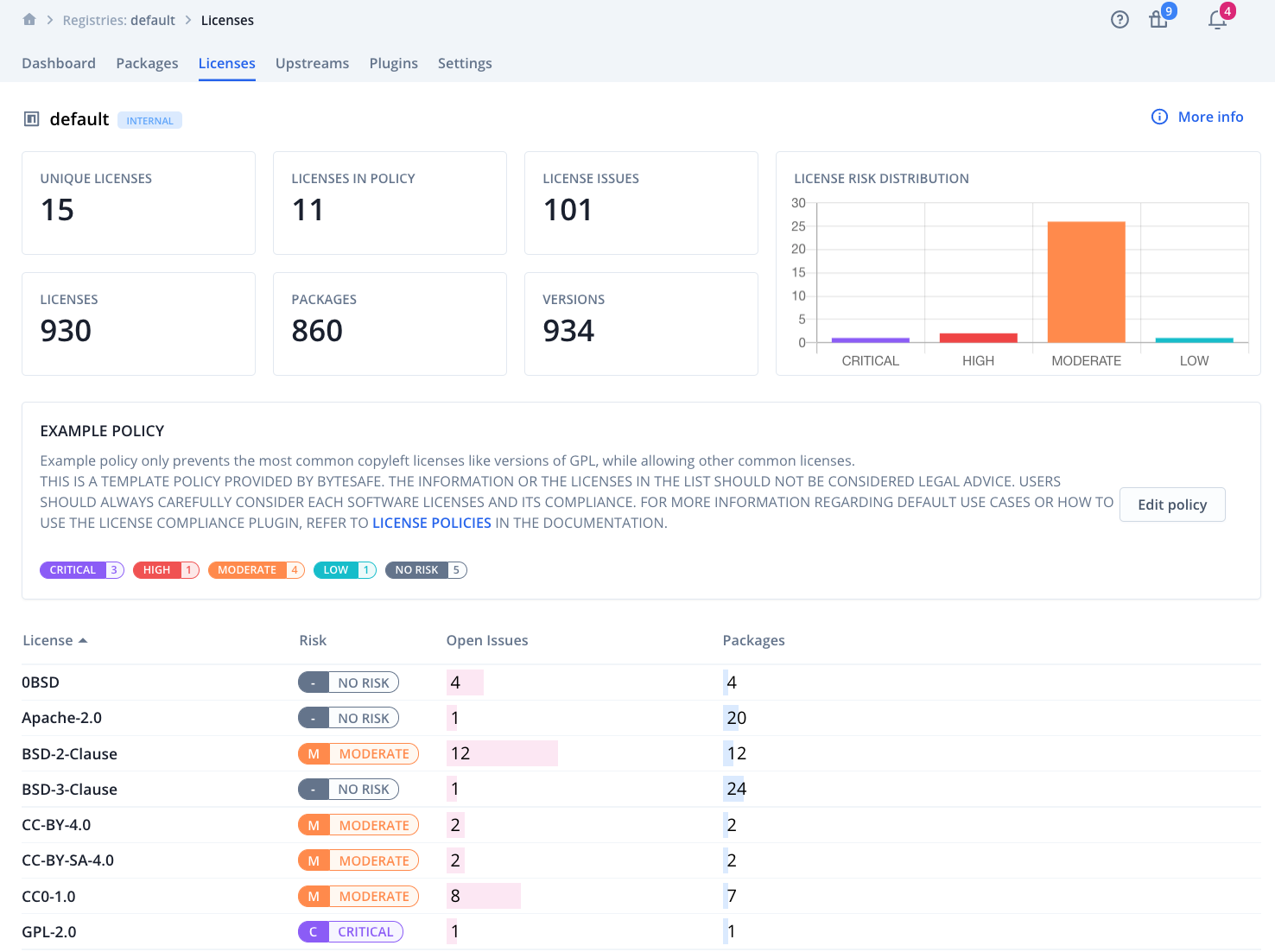
Open source software has revolutionized the software development landscape, providing cost-effective solutions and promoting collaboration among developers worldwide. However, the legal terms associated with open source licenses can be complex, and improper management of these licenses may lead to significant legal risks.
In this article, we delve deeper into open source license legal risks, covering real-world examples, best practices, license selection, community support, license incompatibility, and recent developments.
Even the best developers can make mistakes. Especially in applications using hundreds or even thousands of open source dependencies. And where each dependency has one or more licenses. Tempting to take shortcuts, you end up releasing code bearing license that could have caused legal harm. What are the top open source licenses and what should you do to avoid legal risks?
Here’s a visualization of a starter application using react with more approx. 1600 (!) dependencies - as you understand, manually keeping track of what licenses are used can be a challenge. And if you’re not careful will expose your business to risk.

Real-world examples of open source license legal issues
Real-life examples helps one understand the impact, but not all companies speak out loud about their mistakes. Here are a few examples:
-
John Deere and GPL: In 2023, Software Freedom Conservancy (SFC) has called upon farm equipment maker John Deere to comply with its obligations under the General Public License (GPL).
-
Vizio and GPL: In 2022, the Software Freedom Conservancy a lawsuit was filed agains the TV maker Vizio for allegedly violating the GNU General Public License (GPL) by not providing the source code for some of the open source software that it used in its smart TVs.
-
Panasonic and GPL: In 2017 CoKinetic Systems Corporation filed suit against Panasonic claiming in part $100 million due to GPL license violations
-
Versata and the AGPL: In 2013, Versata Software sued Ameriprise Financial Services for breach of contract and copyright infringement, alleging that Ameriprise violated the terms of the Affero General Public License (AGPL) used in Versata’s software. The case highlighted the complexities of open source licenses and the need for companies to understand their obligations.
-
Cisco and the GPL: In 2008, the Free Software Foundation (FSF) sued Cisco for violating the terms of the GPL license used in multiple open source components included in Cisco’s products. Cisco eventually settled the lawsuit by appointing an Open Source Compliance Officer and making other commitments to ensure GPL compliance.
Best practices for managing open source licenses

Some of the best practices for managing open source licenses include:
-
Establishing an open source policy: This policy should outline the acceptable use of open source components, including the types of licenses that are allowed and the procedures for obtaining and using open source software.
-
Performing continuous analysis of open source components: This can (and should) be done using an automated tool to identify the open source components used in your applications and to ensure that they are all licensed appropriately.
-
Making your teams “license-aware”: Everyone who works with open source software should be aware of the legal risks associated with it and should know how to comply with the terms of the licenses used.
-
Maintaining accurate and up-to-date records of your open source usage: This includes keeping track of the licenses used to avoid litigation, the versions of the components, and the sources from which they were obtained.
-
Monitoring license changes and updates: Stay informed about changes to open source licenses and updates to components, as these can impact your legal obligations.
Top open source licenses and risk category
Below is a list of commonly used open source licenses when using public open source components including their license ID, risk category and if it’s approved by the Open Source Initiative (OSI).
Keep in mind that the popularity of open source licenses can change over time as new licenses are introduced, and the needs and preferences of developers and organizations evolve.
| Open Source License | License ID | Legal risk | OSI approved |
|---|---|---|---|
| GNU General Public License v2.0 or later | GPL-2.0-or-later | High | Yes |
| GNU Lesser General Public License v2.1 or later | LGPL-2.1-or-later | High | Yes |
| GNU Lesser General Public License v3.0 or later | LGPL-3.0+ | High | Yes |
| Eclipse Public License 1.0 | EPL-1.0 | Medium | Yes |
| Eclipse Public License 2.0 | EPL-2.0 | Medium | Yes |
| Microsoft Public License | MS-PL | Medium | Yes |
| Mozilla Public License 1.1 | MPL-1.1 | Medium | Yes |
| Mozilla Public License 2.0 | MPL-2.0 | Medium | Yes |
| Creative Commons Zero v1.0 Universal | CC0-1.0 | Varies | No |
| Apache License 2.0 | APACHE-2.0 | Low | Yes |
| BSD 2-Clause “Simplified” License | BSD-2-Clause | Low | Yes |
| BSD 3-Clause “New” or “Revised” License | BSD-3-Clause | Low | Yes |
| Do What The F*ck You Want To Public License | WTFPL | Low | No |
| ISC License | ISC | Low | Yes |
| MIT License | MIT | Low | Yes |
| SIL Open Font License 1.1 | OFL-1.1 | Low | Yes |
| The Unlicense | Unlicense | Low | Yes |
| Zlib/libpng License | zlib-acknowledgement | Low | Yes |
Choosing the right open source license for your project
When selecting an open source license for your project, consider factors such as:
- Your project’s goals and intended use
- Compatibility with other licenses used in your project
- The level of restrictions or permissions you want to grant users
- The need for patent protection or other legal safeguards
Community and legal support
Organizations such as the Free Software Foundation (FSF) and the Open Source Initiative (OSI) provide resources and support to help companies navigate open source licensing, including legal advice, education, and advocacy.
Recent developments and trends
Stay informed about recent legal cases, regulatory changes, and emerging trends related to open source licensing. For example, the increasing use of blockchain technology and smart contracts has prompted discussions about how open source licenses should be adapted to accommodate these innovations.
By understanding and managing open source license legal risks, you can protect your organization from potential legal pitfalls and ensure that you are using open source components responsibly. Adopting best practices, selecting the right licenses, seeking community support, and staying informed about recent developments will enable you to leverage the benefits of open source software while minimizing legal risks.
Remember that open source software is a powerful tool that can drive innovation and collaboration, but it also comes with responsibilities. By staying proactive and informed, you can make the most of the open source ecosystem while safeguarding your organization’s legal interests.
Final words
In conclusion, navigating the complex landscape of open source license legal risks is essential for organizations that rely on open source software.
Implementing the following strategies can help you stay on top of your open source license obligations:
-
Educate your team: Ensure that your developers and other team members understand the importance of open source license compliance and are familiar with the organization’s open source policy.
-
Work with an automated tool like Bytesafe: Allow a tool to do much of the work for you to avoid human errors and legal risk. Remember, the deeper you look, the more licenses will appear.
-
Stay informed about industry-specific regulations: Be aware of any industry-specific regulations or requirements that may impact your use of open source software, such as data privacy laws, export controls, or government procurement policies.
By embracing a proactive and informed approach to open source license management, your organization can mitigate legal risks and maximize the benefits of using open source components in your software development projects. The key to success lies in striking the right balance between leveraging the power of open source software and meeting your legal and compliance obligations.
Interested in reading more about open source licenses? Then you might find this article useful: Open source license basics - from copyleft to permissive.
Thanks for reading!
Let’s talk
If you’re interested in discussing your use case and hearing more about the benefits that Bytesafe provides to organizations, feel free to schedule a Discovery Call.
We are more than happy to help!





